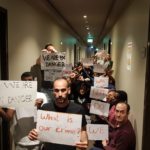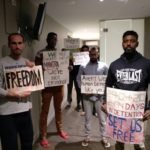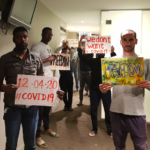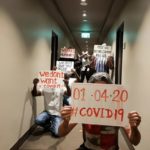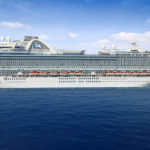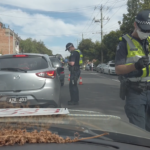Immigration Centres Analogous to Cruise Ships: An Interview With Doctors For Refugees’ Dr Barri Phatarfod
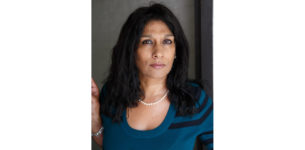
As of two weeks ago, the UK government had released around 400 immigration detainees into the community, with the aim of containing the spread of COVID-19. The move recognises that populations held within enclosed environments are at great risk of rapidly spreading the disease.
Underlying this policy decision is the understanding that detention facilities don’t exist in a vacuum, staff come and go on a daily basis, which means that any virus outbreak at a centre would likely result in further community infections and fatalities.
The recent experience in Singapore has shown how detrimental it can be to simply neglect a portion of the population during a pandemic. The early heralding of its COVID-19 success story was brought to an end when thousands of cases sprung up amongst its forgotten migrant workers.
Singapore went on to have the largest infected population in the Southeast Asia region.
However, despite these well known developments, the Morrison government has refused to consider the welfare of Australia’s immigration detainees, which is an issue that continues to pose a very real threat to our nation’s currently successful pandemic outcomes.
The Mantra Hotel
The public face of Australia’s immigration detainees during the pandemic has been the close to 70 formerly offshore asylum-seeking detainees held at Melbourne’s Mantra Hotel. These men were sent here under the provisions of the Medevac laws.
The Mantra refugees have been distributing photos of daily protests over social media, calling for their release during the pandemic. This proposal would place no further burden upon government as there are community members ready to provide every one of them with safe accommodation.
Long-term Manus Island detainee Farhad Bandesh went as far as to raise the issue of the unsafe circumstances on the ABC’s 22 April Q&A program. And for his trouble the Kurdish detainee was forcibly removed from the Mantra and placed in the MITA detention facility.
In the duty of care
Doctors for Refugees, in conjunction with other organisations, has released an open letter to the Australian government calling on it to take immediate action to prevent the spread of COVID-19 amongst the highly vulnerable immigration detainee population of over 1,400 people.
Born out of concerns over medical mismanagement occurring in offshore detention on Nauru, Doctors for Refugees is a growing group of medical professionals calling for an end to the continued incarceration of those fleeing persecution.
Dr Barri Phatarfod is the founder and president of Doctors for Refugees. The Sydney GP is calling for urgent government action in the face of the COVID-19 crisis, which, as she notes, is far from over, especially when it comes to people held in detention.
Sydney Criminal Lawyers spoke to Dr Phatarfod about the continuing urgency around this situation, how Medevac detainees aren’t being given the treatment they were flown here for, and why releasing the refugees would be a politically successful move for the PM.
Firstly, social distancing rules have been in place amongst the general population for about five weeks. These measures are now being praised as having contributed to the low COVID-19 infection rate in this country.
But, over this time, the over 1,400 asylum seekers and noncitizens being held in onshore immigration detention have been left in enclosed environments with no safety measures being taken to protect them from the virus.
What are your thoughts on the “business as usual” approach the government has taken with those people it’s holding in detention?
It’s quite strange that the government seems to see the refugees as somehow outside the pool of potential infection hosts.
We know the virus spreads through close contact with an infected person and so we have banned all gatherings at an immense, but necessary, cost to the economy.
While the rest of Australia is required to adhere to strict social distancing in supermarkets, parks and elsewhere – with the police ready to enforce these laws – refugees are crammed together with up to 12 bunks in a room, minimal access to basic hygiene aids, such as running water and soap, and with regular contact with staff who have no visible masks or barrier protection.
Treasurer Josh Frydenberg has said that now is not the time for ideological constraints – yet this high-risk system is operational solely because of ideology, and a deeply flawed one at that.
It is analogous to having a little cruise ship permanently stationed in each capital city.
You’ve stated that not only is the government’s continued detainment of these people “cruel, callous and highly discriminatory”, but it’s also “potentially exacerbating a public health crisis”. Can you expand on this?
People in detention are very scared and have described themselves as being “sitting ducks” during this outbreak.
They believe that they are the most expendable part of the Australian community and most have had experience of not receiving medical care when needed.
Adding to this is the overwhelming secrecy around their management with the government very keen to downplay any potential risk they might have, so no one has any confidence that their medical needs will be managed appropriately should there be an outbreak.
There is no Plan B in place if this does eventuate and too many of them have seen their friends die from lack of care in detention.
Last year, an infant girl had a dangerously delayed hospital admission as detention staff had refused to call an ambulance for over a week.
Most people in the centres have been in detention for several years, however it is not a static group. People have been transferred from one centre to another, often between the states.
In addition to the long-term refugees, there are others who come for shorter periods such as foreign nationals who have overstayed their visa or Australian residents whom the government has deemed to have a bad character and are awaiting deportation.
So, particularly in Sydney’s Villawood many transient people come through. None of them have been adequately screened.
But the greatest public health risk comes from the daily workers who go in and out of the centres.
These include security staff, domestic workers, such as cooks and cleaners, interpreters, health providers, maintenance workers and departmental administrators.
None of them are screened, none are given protective wear and all of them go home to families and friends in the wider Australian community.
Would any person feel comfortable if their spouse went to such a workplace every day?
The government’s response is simply to now ban family visits in several centres – which adds to the feelings of isolation and despair while not materially impacting upon the infection control.
This clearly has not been adequately thought through. We have seen Singapore’s previously impressive success at infection containment suddenly come unstuck by an outbreak in the migrant hostels.
This underscores the dangers of failing to take into account an entire subgroup of the population when management planning during a viral pandemic.
There are close to 70 former offshore detainees being held at the Mantra Hotel in Melbourne. They were brought to Australia under the Medevac laws some time ago.
Dr Phatarfod these long-term detainees were brought to this country for urgent medical treatment, which they don’t seem to be receiving.
What does continuing to hold these men in this situation, while there’s a virus going around that’s potentially fatal to those with pre-existing conditions, amount to?
The individuals at these hotels were brought from offshore for urgent medical conditions.
These conditions passed through at least two government contracted doctors and were subject to a review by a government appointed medical panel with the minister of home affairs overseeing every step before coming here.
So, there is no question that their medical needs were genuine. Yet, the overwhelming majority have not received this treatment: a fact that was actually used as an argument to overturn the Medevac law last year, despite the refugees desperately wanting the treatment.
This is quite audacious, but people believe what they want to believe.
In any case, that most of them have medical conditions untreated for several months is not in dispute, and we know that individuals with chronic medical conditions are far more susceptible to serious effects of COVID-19.
Along with heart conditions, poorly managed diabetes, cancers and traumatic brain injuries, many people there have a weakened immunity due to poor nutrition in these centres and possibly from before.
So, if there is an outbreak, spread is likely to be rapid, the effects severe and the management delayed or non-existent.
For those who have been held in detention for long periods, what sort of an impact could being denied the ability to take adequate preventative measures during the pandemic have upon their mental health?
The prevalence and level of depression and anxiety in the detention population cannot be overstated.
Many of these individuals already experienced trauma, torture or sustained assault in the countries they fled from and many have lost family members and have been unable to properly grieve.
We have seen these sorts of mental health presentations with recently arrived refugees who have been successfully resettled.
However, the individuals currently in Australian detention have had a further six or seven years in brutalising detention conditions, seeing their friends die or try to take their own lives while being repeatedly told that they are criminals who violated Australia’s immigration laws.
So, it is already a highly traumatic situation.
Pre-pandemic, the rate of self-harm in the onshore detention centres was over 700 a year or almost two per day, according to the department’s own statistics.
On top of this, there is now a potentially lethal virus, where no one there can take adequate control of managing their risk, as the rest of us are ordered to do.
A refugee is not in a position where he or she can refuse the frequent pat downs from guards or intrusions into their room and some are told they have to put any request for hand sanitiser in writing and wait up to two weeks.
So, effectively, they and their needs are almost entirely overlooked in the pandemic management and everyone there is acutely aware of this.
Despite calls for something to be done for these detainees, the government has managed to simply keep them in now potentially life-threatening conditions.
What role would you say the past demonisation of these people is playing in the government’s ability to do this?
Demonising refugees has played a massive role in enabling successive governments to brutalise these individuals.
We would never be so accepting of a self-harm rate of one in three in any other group, or turn a blind eye when someone is beaten to death by a pack of security guards.
When previous governments have publicly welcomed refugees such as post-war, and again in the 1970s and 1980s, the Australian community was largely supportive.
Somewhere along the line refugees were found to be an ideal political tool and successive governments have simply followed suit.
The question to consider now is what purpose it continues to serve.
The refugee human rights issue has been a festering sore for various Australian governments, and a very expensive one at that, but both sides of politics have painted themselves into a corner on this, ramping up the fear and rhetoric to a point where they feel they can’t back down.
There is only so long this can be sustained for, and already we see public interest moving away from vilifying refugees – possibly because there are various other groups they want to vilify at this time.
If ever there was to be an end to this issue, now would be the time, when Australians are more united than they have been in decades and looking to the prime minister for strong leadership.
Scott Morrison should arrange the release of all refugees and asylum seekers into the community during this time of the pandemic and allow to have their claims processed from there.
Otherwise he is effectively saying he sees more value in these centres existing forever.
Over recent weeks, there has been talk of easing the pandemic restrictions in this country, due to the success of the low COVID-19 infection rate.
Would you say this makes the matter of those being held in immigration detention any less urgent?
For the people in detention, what happens in the community does not directly impact them as the centres function entirely by their own rules.
Easing of the restrictions in the community will automatically translate to an increased rate of community infection, but this is considered the trade off to reignite the economy and restore freedoms.
For people in detention they will be exposed to the greater infection risk, simply by virtue of being in the same physical location as community members, but clearly will not be a beneficiary of the restarted economy and freedoms. So, it is actually worse for them.
And lastly, Dr Phatarfod, what do you want to see happen from here? What measures would it be reasonable to expect the government to take towards these people who are under its care?
There is no exit strategy planned for these individuals in detention and never has been.
So, either they will spend the rest of their lives in Villawood or BITA at a massive ongoing economic and other cost to the Australian community, or there will be a crisis that forces the closures.
The problem with a crisis is that it is highly unpredictable and as we have seen with this current pandemic, it can also have devastating outcomes.
This would be a good thing to avoid, especially as we have the luxury of advanced notice of what has happened in other countries.
The government should use this time to release these people into the community where many have families, including a spouse and children.
Politically, the Australian government does not have much to risk as public interest is overwhelmingly elsewhere and they are not going to lose voters to anyone else over this move.
Conservative governments in the UK and USA, as well as Greece where the refugee issue has also been widely polarising, have been releasing people from immigration detention during this pandemic for exactly this reason.
The same people who were advocating for harsh treatment of refugees may well be the people that blame the government if one of their loved ones dies as a result of transmission connected with the centres.
The prime minister is enjoying a high level of popularity and respect right now.
Releasing the refugees from detention during this pandemic would be a strong and ultimately responsible move and likely to see him gain significant support from the substantial section of the community who have long despaired of both sides of politics in this area.
It’s quite hard to see what he would gain from keeping them locked up at the moment and in doing so there is an enormous risk all around.


